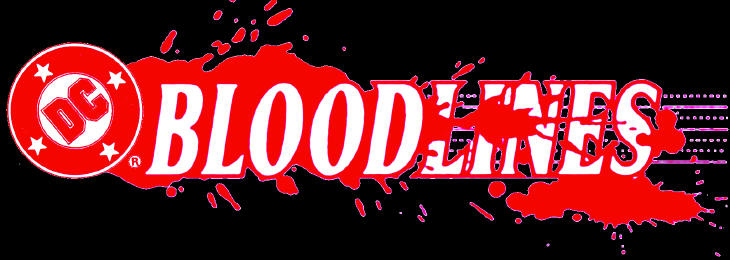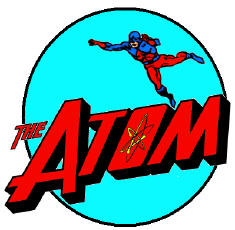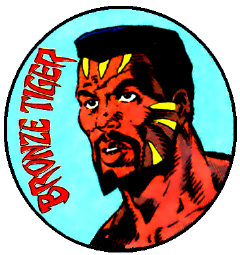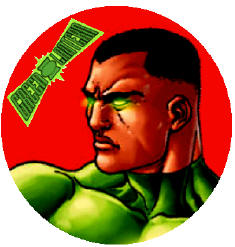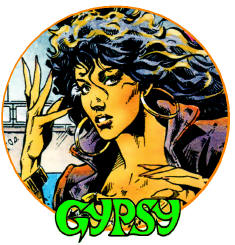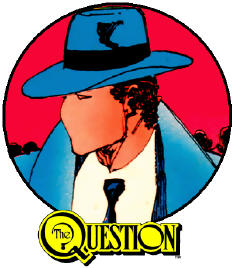
Pulp heroes like Tarzan preceded comic strip heroes like Flash Gordon and Dick Tracy in becoming movie serials. It wasn't until 1941 that comic book super-heroes began appearing with
Adventures of Captain Marvel. Batman and Captain America, along with several other now forgotten long underwear types, had years worth of head start on Superman. However, 1948's Kirk Alyn-starring
Superman was just about the biggest serial ever, followed by
Atom Man vs. Superman in 1950. The serials were dying out though, so
Superman and the Mole Men was released as a feature film the following year, and then the whole shebang was moved to television with
Adventures of Superman (1952-1958.) By that point, DC Comics was essentially the only game in super-heroics, and their properties dominated the airwaves throughout the 1950s-1970s.

Marvel Comics began to erode DC's heroic hegemony in the 1960s, but didn't offer truly noteworthy competition until the live action
Incredible Hulk (1977-1982) and the various animated Spider-Man series. DC maintains a relative monopoly on live action television shows, but has been in constant conflict with Marvel for cartoon viewers since the 1990s. DC had the prestigious, well written, fluidly illustrated Bruce Timm shows, and Marvel had a flood of clunky fan-baiting crap, which was nonetheless perfect for the Chromium Age viewership. Marvel had considerably more trouble breaking into feature films, lacking the licensing power and recognition of DC. Where the first
Batman and
Superman films were boffo successes that paved the way for more four-color features, Marvel seemed bound to close every door DC opened, beginning with the notorious bomb
Howard the Duck in 1986. It took another twelve years for Marvel to manage an actual (if minor) hit with
Blade. In 2000, the
X-Men arrived, and both features became trilogies. The sea change turned into a tsunami with 2002's
Spider-Man, becoming a massively lucrative franchise. Other film companies had varying degrees of success with Marvel characters, but the true game changer was the formation of Marvel Studios to exploit their own properties, beginning with 2008's
Iron Man. For the first time, the breadth of comic book "universes" had traveled with the characters into the cinema, allowing Marvel properties to support one another, and providing a consistency of quality supervision.

With
Marvel's The Avengers earning 1½ Billion Dollars, there's been a major push at Warner Brothers to replicate that success. This forgets that
The Dark Knight Rises made $1.1B the same summer. I've often taken the WB to task for fixating on Superman and Batman at the expense of all other DC properties, but there's something to be said for that focus. Besides keeping those characters vital and highly profitable for much of the past seventy years, Warner Brothers have so mythologized their role in popular culture that their films are increasingly approached as art. The pedigree of their directors and the operatic scope of their films are deemed worthy of Oscar attention. Marvel Studios want to be your friend-- they're funny and hip, but are they truly timeless? Personally, I liked
Thor well enough on first viewing, but found it a tiresome, lightweight
Superman 2 retread on home video. I watched
Captain America: The First Avenger three times at the theater (with the specific goal of matching my previous inadvertent most seen projected film, the 1989
Batman) and several more times at home. I remain quite content with it, but is that because I have so much more love for that character, or perhaps because the Star-Spangled Avenger is the closest thing Marvel has demonstrated to DC's grandeur? On the other hand, I've liked the
Iron Man movies in first run, but have found my appreciation grows through repeat viewing (my girlfriend throws them on all the time) and retroactive relevance. For instance, I hated Scarlett Johansson in
Iron Man 2, but the improvements made to her character and performance in
Avengers make me appreciate Black Widow more in her first movie through continuity.

That having been said, I see major problems in the future with Marvel's approach. At some point, Robert Downey Jr. is going to retire as Tony Stark. So far, a substantial amount of the appeal of the Marvel Movieverse has been based around personality, most specifically his.
Marvel's The Avengers is a great film because Robert Downey Jr. got to bounce off of Chris Evans, Mark Ruffalo, Chris Hemsworth and Samuel L. Jackson, just as what makes the Iron Man movies is his repartee with Gwyneth Paltrow, Don Cheadle and the rest. Take Downey out of that equation, and do you really care about what these guys get up to? The "Phase Two" pictures are focusing more on the individual heroes' stories, but with the origins and build up to forming the Avengers dispensed with, how strong are the properties on their own? Captain America has the benefit of being a defacto S.H.I.E.L.D. movie and quasi-sequel to
The Avengers by carrying Nick Fury, Black Widow, Maria Hill and even Jasper Sitwell with him. Thor has... the Dark Elf?
Guardians of the Galaxy are relying on James Gunn, which should hopefully allow them a Joss Whedon style commercial victory for signing a cult favorite, but there's no guarantee in that. I must also confess that they went and killed my absolute favorite character of the entire Marvel Movieverse, Agent Phil Coulson as played by Clark Gregg. Knowing that Coulson won't be in any more movies is honestly and surprisingly a blow to my enthusiasm for the whole franchise, plus I now have this strange urge to watch episodes of
The New Adventures of Old Christine.

Marvel Studios' approach owed a lot to Fox's X-Men films, which are themselves struggling to reinvent themselves. They've retained Hugh Jackman's star-making turn as Wolverine, and fortunately for the studios, his charm has never seemed to carry him past playing Logan again and again. However, Wolverine is a physically demanding role, and Jackman's getting older, plus he's associated with some very unloved installments of the franchise. The X-Men are sold as an ensemble, and has already proven capable of swapping characters and actors in and out in a way I'm not confident Marvel could with their Avengers. Wolverine is bigger than Hugh Jackman, so while I'm sure he's welcome to the part long term, you can get another surly, charismatic, well-built actor to portray Logan and still have a guaranteed audience. Further, Fox is rebooting their half-hearted
Fantastic Four franchise, so even after losing the rights to Daredevil, they still have plenty of material to start their own cinematic universe of Marvel characters.

Marvel's biggest, easiest sell of a character remains Spider-Man, which Sony retains the rights to. The approach to the Spider-Man movies have been more grand, so while I wouldn't count on seeing a Black Cat spin-off anytime soon, Sony will continue to draw eyes to their Web-Slinger, who will inevitably compete with both Marvel and Fox for blockbuster dollars. Sony also proved with their soft reboot
The Amazing Spider-Man that despite comparatively softer returns, they could return to the web-slinging business much more quickly after the broadly disliked
Spider-Man 3 than Warner Brothers could after
Batman & Robin or
Superman Returns stunk up the place. Sony could even mingle Ghost Rider in there, not than anyone's dying to see that, but it could be a bridge to a darker franchise involving characters like Venom, Morbius and Carnage.

Warner Brothers has faced a lot of criticism for their handling of the DC Comics heroes, especially in light of how well the Marvel characters are doing across three other studios. They're also the people that brought us
Supergirl, Steel, Catwoman, and
Jonah Hex, besides running Superman and Batman aground at various points. To my mind,
Green Lantern was their greatest recent failure. It was clearly an attempt to create their own
Iron Man, but with none of the passion or clarity of vision that launched Marvel Studios. Instead, disinterested hacks had gobs of money thrown at them, and the first legitimate attempt to expand the DC film universe beyond the World's Finest duo performed poorly enough that everyone involved seem to hope it will simply drift out of the public consciousness. Curiously, it reminded me a lot of that first disastrous Marvel movie,
Howard the Duck, from the casting of Tim Robbins to the scattershot tone to the poorly played thin characters to the visual excess... all in service to a formulaic plot. Nothing seemed left to chance, with a script worked over into a safe, dull patchwork of tropes that failed to connect to an audience. Warner Brothers adopted all of the trickiest aspects of the Marvel shared universe and botched the execution of all of them. It's frankly terrifying to think of their attacking the Justice League property with the same mercenary, misguided zeal.

I'm personally disdainful of two out of the three Christopher Nolan
Dark Knight films, but I think that even if Warner Brothers could manage to properly replicate the Marvel Studios formula, they would still be just one of several studios trying to produce that same sort of super-hero movie. Richard Donner, Tim Burton and Christopher Nolan defined the Warner Brothers approach of treating comic book properties respectfully as a form of modern mythology, while Sam Raimi successfully applied that interpretation to Sony's Spider-Man films. The three super-heroes chosen as their subjects are inarguably among the most important in popular culture, and by taking them seriously, this trinity have risen above all others in longevity, relevance, and of most concern to studios, profitability. Zack Snyder approached
Watchmen with a similar aesthetic, and while that property lacked legs with the general public, signs point to
Man of Steel being something truly special under his hand. For gods sakes, they have a completed script for a Wonder Woman movie by Joss Whedon sitting in a drawer, so what exactly is the hold-up in getting a director and filming one of the only other characters that could compete on a world stage with Superman and Batman in recognizability?

At the same time, Warner Brothers has to understand that the Flash, Aquaman, Martian Manhunter and most of their other properties have been consigned to
Super Friends and
Justice League reruns for years, with far less of a resonance than most Marvel characters. They don't have to spend a fortune on each of them, but they will need to take chances and recruit daring, committed filmmakers to make properties such as those resonate with modern audience (with Guillermo del Toro's
Dark Universe being an excellent initial step.) I think that Warner Brothers should allow Marvel to have its day, since the inter-dependency of their movies will likely feel structural stresses as their current actors age, falter or price themselves out of service. Marvel Studios can't reboot any one of their properties without having to restart their entire universe, and they don't have the strength of a Spider-Man or Wolverine to fall back on if Iron Man doesn't fly with, say, Jesse Eisenberg under the hood. I feel it's best for Warner Brothers to take the long view, to set aside the time and effort to make each of the best loved DC heroes work in their own individual features. Then, when the heat of Marvel's moment has passed and they're trying to figure out how to make things work on tight budgets with lesser actors and characters, Warner Brothers can blow everyone's minds with an epic, sturdy Justice League film to bowl over the next generation of viewers. In the meantime though, how about that awesome
Wonder Woman already?
